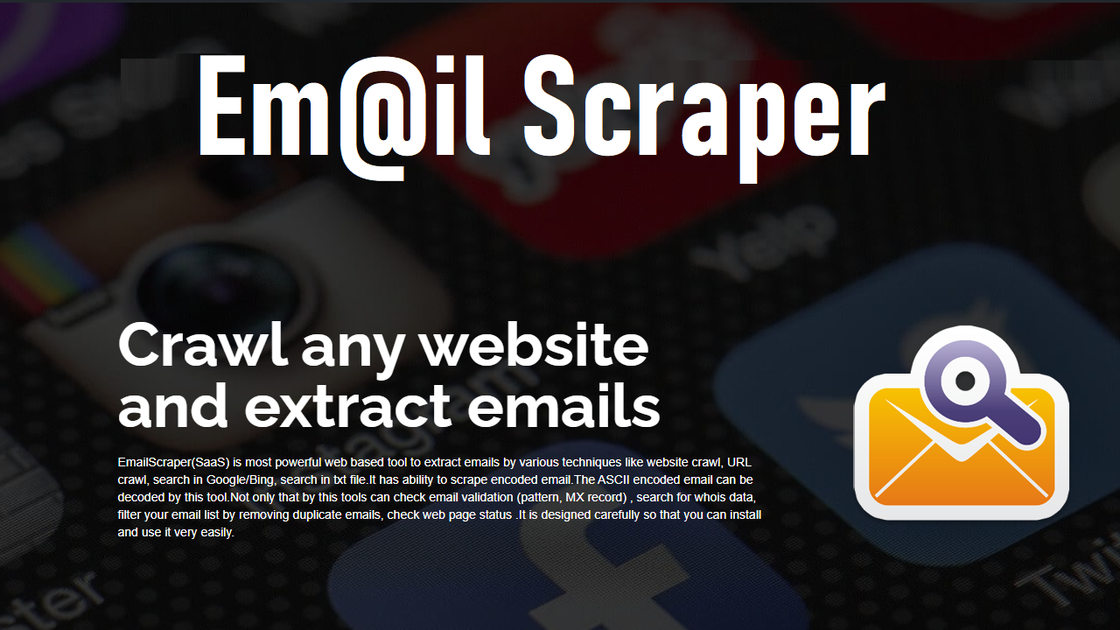
Email parsers or scrapers extract email addresses from online sites. These tools can usually retrieve email addresses from online sites and upload them to an Excel file. Professional scrapers frequently extract data from social networks (LinkedIn, Facebook, etc.) or forums to obtain email addresses. If a company needs to find the email addresses of legal entities, it goes to their corporate websites.
Web scrapers automate data collection. Their greatest benefit is speed. In a few minutes, one can find 100 addresses. The program may also save, process, and display data graphically. Email scraping involves the following steps:
- The program searches and picks websites based on subject (keywords), publication date, and location (you can configure their list manually).
- Your web scraper examines the selected sites for “@” and “email” lines.
- Adding matching objects to your database is easy.
Why do you need an Email Scraper?
Marketing and business offer require an email database of potential clients. Because every trade offer must precisely match the target demographic, the database must be particular and concentrated. So, your web scraper must only capture necessary email addresses.
Most sales managers say that finding new customers takes up a lot of time. Only a few true clients will respond from hundreds of processed people. So, email scraping helps you acquire a big database of email addresses, discover clients faster, automate email marketing campaigns, and track past actions.
Web scraping’s negative perception
Web scraping offers many benefits and saves us a lot of time, yet it has a bad reputation for the following reasons:
- Web scraping gives businesses a competitive edge. So, there is often a financial motive.
- Some companies utilize online scraping without regard for copyright or the site’s terms of service.
- Parsers, for example, can submit many more queries per second than humans, causing site congestion. Scrapers can also remain anonymous and avoid self-definition. As a result, they can circumvent security measures that prevent data from being downloaded automatically.
Legality of E-Mail Scrapping
While email scraping is incredibly beneficial to organizations, it is becoming increasingly problematic legally. Because email scraping obtains pre-existing data from the web, businesses using email scrapers may encounter ethical and legal issues. Email scraping falls under the legality of web scraping, which is still up for debate.
Web scraping is legal if done properly. The crucial part is how you will use the parsed data. After all, you could easily scrape or crawl your own website. Or you’re a company looking to collect data without partnering. It also involves digital marketing (scraping online evaluations about your brand, detecting bad feedback to respond quickly), analytics (analysing competitors’ pricing) and other uses. If the scraped data is public, the procedure is legal. So, email scraping is legal if you acquire contacts that are publicly available.
When scraping a website for contact information, be sure to read the TOU. The website itself clearly states the Terms of Use and Copyright. In most cases, the website’s proprietors declare whether web scraping is permitted or not. Illegal web scrapping involves scrapping:
- copyrighted data;
- private data that requires usernames and passwords;
- and selling personal data to a third-party.
Your website account also allows the website owners to collect more information about you, such as how and where you log in and how you use their service. With these data, website owners may easily identify web scraping on the platform and prohibit you. It’s advisable to look for publicly available data first, and then assess the hazards of scraping behind a login screen.